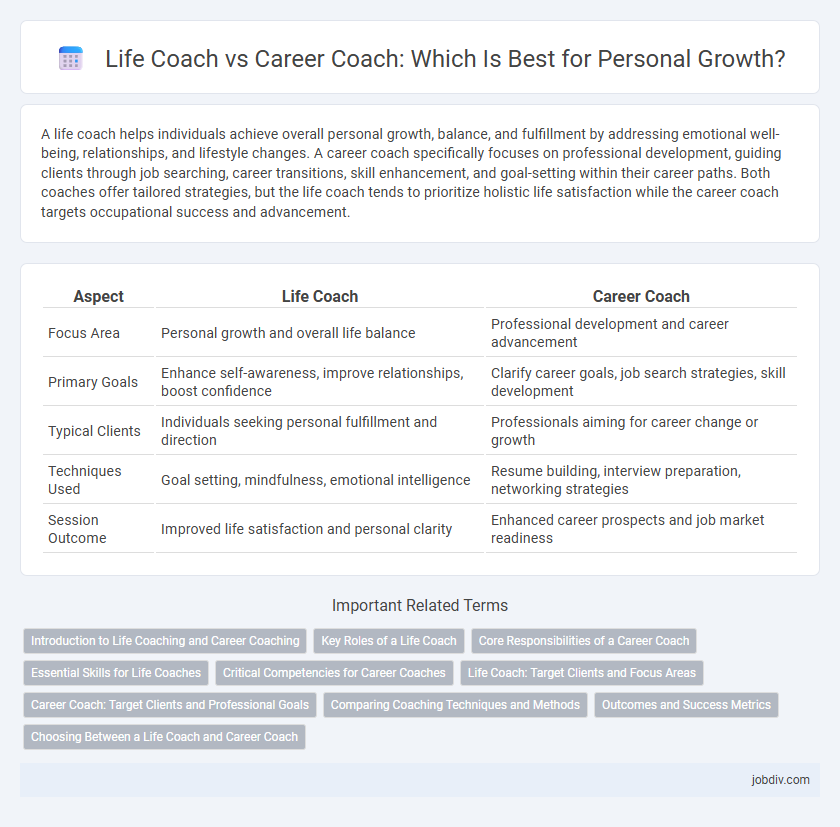A life coach helps individuals achieve overall personal growth, balance, and fulfillment by addressing emotional well-being, relationships, and lifestyle changes. A career coach specifically focuses on professional development, guiding clients through job searching, career transitions, skill enhancement, and goal-setting within their career paths. Both coaches offer tailored strategies, but the life coach tends to prioritize holistic life satisfaction while the career coach targets occupational success and advancement.
Table of Comparison
| Aspect | Life Coach | Career Coach |
|---|---|---|
| Focus Area | Personal growth and overall life balance | Professional development and career advancement |
| Primary Goals | Enhance self-awareness, improve relationships, boost confidence | Clarify career goals, job search strategies, skill development |
| Typical Clients | Individuals seeking personal fulfillment and direction | Professionals aiming for career change or growth |
| Techniques Used | Goal setting, mindfulness, emotional intelligence | Resume building, interview preparation, networking strategies |
| Session Outcome | Improved life satisfaction and personal clarity | Enhanced career prospects and job market readiness |
Introduction to Life Coaching and Career Coaching
Life coaching focuses on personal growth, emotional well-being, and achieving overall life balance, helping clients unlock their potential and set meaningful goals. Career coaching specializes in professional development, offering guidance on job transitions, skill enhancement, and career path strategies to improve job satisfaction and advancement. Both approaches utilize tailored techniques but target different aspects of an individual's life for holistic success.
Key Roles of a Life Coach
A life coach primarily focuses on personal development, helping clients set and achieve goals related to self-awareness, emotional well-being, and life balance. They guide individuals through challenges like improving relationships, building confidence, and finding purpose beyond professional ambitions. Unlike career coaches, life coaches address holistic growth, integrating mental, emotional, and lifestyle aspects for overall fulfillment.
Core Responsibilities of a Career Coach
Career coaches specialize in guiding individuals through professional development, including resume building, job search strategies, interview preparation, and career transition planning. Their core responsibilities involve assessing skills and interests to align clients with suitable career paths and providing ongoing support for goal setting and advancement. Unlike life coaches who address broader personal growth, career coaches focus specifically on enhancing career success and workplace performance.
Essential Skills for Life Coaches
Life coaches excel in active listening, empathy, and goal-setting techniques to help clients achieve personal growth and overcome emotional barriers. They employ strong communication skills, emotional intelligence, and motivational strategies tailored to individual values and life purpose. Unlike career coaches, life coaches emphasize holistic well-being, mindset shifts, and accountability to foster lasting transformation.
Critical Competencies for Career Coaches
Critical competencies for career coaches include strong expertise in career development theories, effective assessment of clients' skills and interests, and the ability to create personalized career plans. They must demonstrate proficiency in networking strategies and job market trends to provide relevant guidance. Emotional intelligence and motivational skills are essential for supporting clients through transitions and achieving professional goals.
Life Coach: Target Clients and Focus Areas
Life coaches primarily target individuals seeking personal growth, enhanced self-awareness, and improved quality of life. Their focus areas include goal setting, stress management, work-life balance, and building healthy relationships, addressing holistic well-being rather than just professional development. Unlike career coaches, life coaches guide clients through broader life challenges to foster overall fulfillment and resilience.
Career Coach: Target Clients and Professional Goals
Career coaches specialize in guiding professionals seeking advancement or transition within their industry, focusing on goal setting, skill development, and job search strategies. Their target clients often include mid-level managers, recent graduates, and individuals aiming for leadership roles, all seeking tailored advice on career growth. Emphasizing measurable outcomes, career coaches help clients align their professional goals with market opportunities to maximize success.
Comparing Coaching Techniques and Methods
Life coaches utilize holistic techniques such as visualization, goal-setting frameworks like SMART goals, and motivational interviewing to enhance overall personal growth and self-awareness. Career coaches employ targeted methods including skills assessments, resume building, and interview preparation to specifically advance professional development and job attainment. Both coaching styles integrate active listening and personalized feedback, but vary in focus from life balance to career trajectory optimization.
Outcomes and Success Metrics
Life coaches focus on enhancing overall personal fulfillment, emotional resilience, and achieving work-life balance, measuring success through client satisfaction, goal achievement, and improved well-being. Career coaches target professional growth, skill development, and job transition strategies, with outcomes evaluated by promotions, salary increases, and successful career changes. Both coaching types use tailored action plans and regular progress assessments to optimize client results in their respective domains.
Choosing Between a Life Coach and Career Coach
Choosing between a life coach and a career coach depends on your primary goals; life coaches help improve overall well-being, relationships, and personal growth, while career coaches focus on professional development, job transitions, and skill enhancement. Understanding whether your challenges are predominantly personal or work-related will guide your decision toward the most effective coaching support. Evaluating your current needs and desired outcomes ensures that you select a coach specialized in addressing those specific areas for optimal results.
Life Coach vs Career Coach Infographic

 jobdiv.com
jobdiv.com